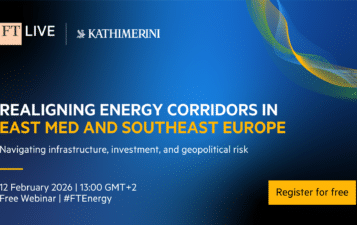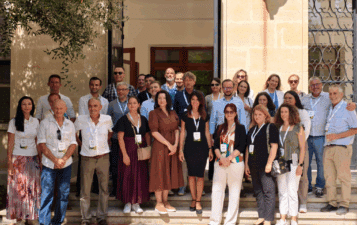What is Eastern Lights?
The Eastern Lights project creates practical tools, knowledge, and infrastructure to reduce CO₂ emissions and help Europe reach climate neutrality by 2050.
The project partners will:
-
-
- investigate the possibilities for storing CO₂ in Bulgaria
- test ways to transport CO₂ across countries
- create systems to monitor the entire process
- support governments in shaping regulations related to Carbon Capture, Utilisation and Storage (CCUS)
- engage with the public to raise awareness and understanding
-
Read more here.

Breaking ground
Laying the foundation for CO₂ reduction across Eastern Europe.
Supported by Horizon Europe funding, the Eastern Lights project is a crucial first step towards a large-scale onshore CCUS cluster in Eastern Europe. This initiative, centered in North West Bulgaria and driven by a powerful collaboration of 19 organisations across 8 countries, will de-risk development by demonstrating CO₂ transport and storage capabilities. By uniting diverse expertise, Eastern Lights aims to eliminate key uncertainties through industrial demonstration, in-depth research, and proactive stakeholder engagement.
Why CCUS?
Reaching net zero means that the amount of greenhouse gas we emit is balanced with the amount we remove. CCUS is an essential tool in achieving net zero because it enables industries to significantly reduce or neutralise their emissions. This is particularly important for sectors that are hard to decarbonise, such as cement, steel and chemicals.

The Eastern Lights demonstration project is a pivotal undertaking, allowing us to rigorously test the feasibility and safety of onshore CO₂ injection – a critical step towards deploying large-scale CCUS solutions in Eastern Europe. This initiative provides invaluable insights for building the necessary infrastructure to significantly reduce our carbon footprint and contribute to Bulgaria’s net-zero ambition.
Rossen Papazov, CEO of Holcim Bulgaria

News

FT LIVE Webinar: Realigning Energy Corridors in East Med and Southeast Europe
12th February 2026 | 13:00 GMT+2 | Free Webinar This exclusive webinar, hosted in the lead-up to the Energy Transition…

Webinar – Unlocking CCUS in Eastern Europe: Aligning EU Policy, Funding and National Action
The Eastern Lights consortium has organised a webinar to explore the regulatory and funding landscape shaping Carbon Capture, Utilisation and…

Second Consortium Meeting in Montpellier
The Eastern Lights consortium held its second project meeting from 8–10 September 2025 at Montpellier University, France. Hosted by CNRS,…
Our impact
The Eastern Lights project consortium is composed of 19 project partners from 8 countries in Europe working together to make decarbonisation accessible to emitters in Eastern Europe.

Newsletter
Be the first to receive news about Eastern Lights.

Frequently Asked Questions
Carbon dioxide (CO₂) is a gas that occurs naturally in our atmosphere. It consists of one carbon atom and two oxygen atoms, and is fundamental for life on earth. However, CO₂ is also a component of mixed gas emissions from various industrial sources, including power plants and factories. Elevated levels of CO₂ in the atmosphere contribute significantly to global warming. To mitigate climate change and its associated impacts, it is essential to reduce CO₂ emissions. One potential way to do so is with CCUS (Carbon Capture, Utilisation and Storage).
Carbon neutrality means balancing the amount of carbon dioxide (CO₂) and other greenhouse gases emitted with the amount removed from the atmosphere, so that the net emissions are zero.
This project supports Bulgaria’s and the EU’s efforts to reduce carbon emissions and fight climate change. It is a chance to assess how CO₂ can be stored long-term at the selected storage site. Injection tests will provide important information about the amount of CO₂ that can be stored, which can help lower emissions in this part of Bulgaria.
By providing a way to store CO₂, the project also helps with the economic impact of transitioning away from fossil fuels by protecting jobs and supporting local communities during the transition.
Several hundred workers will be needed during the early phases of the project, with more than 200 positions expected to open up in the initial technical surveys, and over 100 additional roles during the next stages of development. As the project moves forward, skilled specialists will also be needed for ongoing operations and maintenance.
Several noteworthy CCUS projects exist across Europe and beyond. In Europe, Northern Lights in Norway aims to develop a transport and storage network for CO2 captured from industrial sources, while the Porthos project in the Netherlands focuses on transporting CO2 from Rotterdam’s industries to the North Sea for storage. In the UK, the East Coast Cluster is a CCUS hub, integrating multiple industrial sources for decarbonisation. In the United States, the Illinois Basin – Decatur Project demonstrated the safe geological storage of CO2, contributing to sustainable energy practices. These initiatives demonstrate a global commitment to leveraging CCUS technology to reduce greenhouse gas emissions and combat climate change.
Yes, Eastern Lights receives € 19,122,237 of EU funding for this project under the Horizon Europe Research and Innovation programme.
If you have any questions or would like to learn more, feel free to contact us at contact@easternlights.eu. We are happy to help and will respond as soon as possible.
